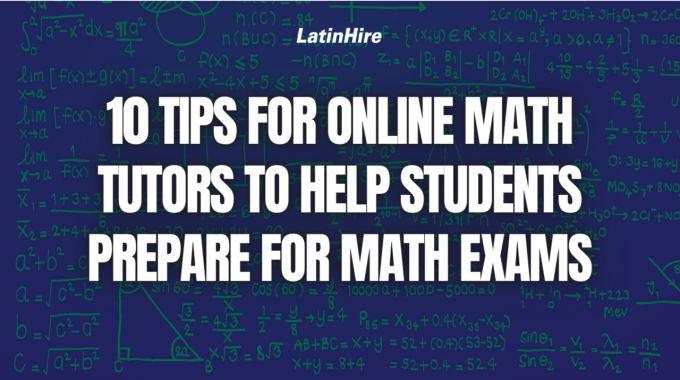Quantum numbers form the foundation for understanding atomic structure and electron behavior. These numbers describe…

10 Tips for Online Math Tutors to Help Students Prepare for Math Exams
Preparing for a math exam can be a daunting experience for students. Many students suffer from math anxiety, while those who don’t may also find certain math topics to be overly challenging.
As an online math tutor, you have the unique opportunity to provide personalized support and effective strategies that can make a significant difference in your students’ exam performance and overall academic success.
Here are 10 tips on how to help your students get ready for their math exams:
1) Understand the Exam Format and Content
Before diving into preparation, it’s essential to understand the structure and content of the exam. Review the syllabus and any provided materials to identify key topics and types of questions that will be covered. This will help you tailor your sessions to focus on areas that are most likely to appear on the test.
If your student does not have this information, ask them to request this information from their teacher. Most teachers would be happy to provide the structure and breakdown of their summative assessments.

2) Create a Study Plan
Work with your students to develop a study plan that breaks down the material into manageable parts. Set specific goals for each tutoring session, ensuring that all topics are covered well in advance of the exam date. A structured plan helps students stay organized and reduces the stress of last-minute cramming.
Give your students a set of practice questions to review after your tutoring session and take them up at the start of the next session. Make sure your students have a solid grasp on foundational topics before moving on to more difficult topics.
3) Focus on Weak Areas
Identify the topics where your student struggles the most and prioritize these areas in your tutoring sessions. Ask to see their previous tests and assessments to analyze their weak points and find or create similar types of questions to enhance their understanding of those topics.
Use a variety of teaching methods, such as visual aids in the form of videos/diagrams, practical examples, and interactive exercises, to help them grasp difficult concepts. Regularly review these topics to reinforce their understanding.
4) Practice, Practice, Practice
Math is a subject that requires persistent practice. Provide your students with plenty of practice problems, including past exam papers and sample questions. Encourage them to solve these problems under timed conditions to simulate the exam environment and improve their time management skills.
Even if your student solves a problem correctly, it does not mean that they have fully grasped this concept. Make sure to have them solve a few more similar types of questions, to ensure the first one wasn’t a fluke and they can produce consistent results.
5) Teach Problem-Solving Strategies
Equip your students with effective problem-solving strategies. Teach them how to break down complex problems into smaller, more manageable steps. Show them how to approach different types of questions, such as multiple-choice, short answer, and word problems.
Have them highlight the important pieces of information provided in the question, such as numerical values, variables to solve, and units of measurement. Emphasize the importance of checking their work and ensuring their answers make sense.

6) Review and Reinforce Concepts
Regular review sessions are crucial for retaining information. Use quick quizzes, flashcards, and summary sheets to reinforce key concepts. Repetition helps to solidify their understanding and makes it easier to recall information during the exam.
If time permits, have your students create a comprehensive study guide that summarizes all of the topics that are covered on the exam. The process of recreating existing information in a new way can strengthen a student’s comprehension.
7) Encourage a Growth Mindset
A growth mindset can greatly influence exam performance. Encourage your students to believe in their abilities and stay motivated. Provide positive reinforcement and celebrate their progress.
Help them see failure as feedback and an opportunity to grow and get better. If they get some questions wrong, ask them to keep trying again until they can confidently solve them.
8) Use Online Resources
Take advantage of the vast array of online resources available. Use educational websites, video tutorials, and interactive apps to supplement your teaching. These resources can provide additional explanations and examples that can enhance your students’ understanding.
There are also online quizzes and tests your students can use to practice the material. Using a mix of different online resources will ensure that your students get all the help they need to master those math topics.
9) Stay Accessible
Make yourself available for questions and additional support, especially as the exam date approaches. Offer extra hours of tutoring sessions if your students require more help. Respond quickly to emails and messages to provide your students with the reassurance they need to tackle any last-minute uncertainties.
Of course, don’t compromise on your work-life balance and mental health, but if you have the means to give additional support to your math students, they will certainly appreciate it.

10) Simulate Exam Conditions
As the exam date nears, conduct mock exams to simulate the actual test conditions. This helps students become familiar with the format and timing of the exam, reducing anxiety on the day of the test. Review their performance in these mock exams to identify any remaining areas that need improvement.
By following these strategies, you can provide your students with the tools and confidence they need to excel in their math exams. Your guidance and support play a vital role in their academic success!
Do you have any other tips for helping your math students prepare for their exams? Share them in the comments below!



